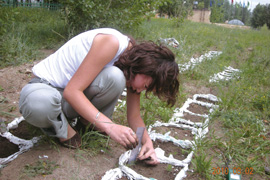The Mitsui & Co. Environment Fund
Introduction to Grant Projects
Mongolian University of Life Sciences School of Ecology, Technology and Development (recommended by the Mitsui & Co. Asia Pacific BU)
Advancing the integration of desert tree-planting activities with methods to restore grasslands, such as livestock population management
Activity grant
- Project Description
Mongolia's dizzying economic growth has been accompanied by rapid desertification caused by overgrazing, and there is an urgent need to restore ecosystems and build and promote sustainable development models. This project aims to develop desert planting and grassland cultivation methods that save water, such as ones using water retention agents, for the poorest areas of Jinst Sum in Bayankhongor Province, and expand planting and grassland restoration areas.It will also providing the framework for cultivating livestock using pasture with high nutritional value, preventing infections, and inspecting meat quality, to increase the potential for high-quality meat export. These initiaitives will be used as models for desert greening and sustainable development.
- Fields
- Climate changePreservation of surface soil and forestsPreservation of biodiversity and ecosystem
- Grant year
- FY2009 Activity Grants
- Grant term
- 3 years
April 2010 - March 2013
- Grant amount
- 10,450,630 yen
- Activity region
- Jinst Sum, Bayankhongor Province, Mongolia

Overview of the Organization

- Representative
- Tumurtogtokh Erdenetsogt, President
- Establishment
- 1999
- Establishment purpose
- Since Mongolia shifted to a market economy, there has been greater focus on food quality, safety, and sanitation management, particularly for agricultural produce, but the country has not been cultivating experts in these fields. Technology and ecology are also extremely important for the development of Mongolia and the lives of its people. The Mongolian University of Life Sciences' School of Ecology, Technology and Development was established with the aim of developing new fields of study for Mongolia and cultivating experts in these fields.
- Main area of activity
- Ulaanbaatar, Mongolia
- Staff
- 35 full-time staff members
- Annual operating budget
- 2.17 billion yen in 2007, 2.19 billion yen in 2008, 2.20 billion yen in 2009
- Recent activities
- The school covers three core subject areas - agricultural production management and evaluation, ecology, and technology - and offers graduate, masters and doctoral courses in fields including agricultural production quality and sanitation control, conservation and ecology, environmental management and evaluation, farm management, and fishery technology. It is also engaged in research in each of these fields.